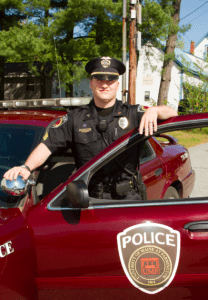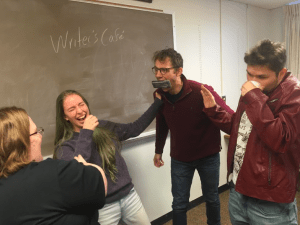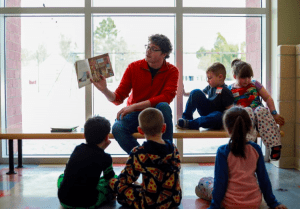Mar 13, 2020 | Sports |
Samantha Creech Contributing Writer
The head coach of men’s basketball, Dick Meader, has made a profound impact on the team since 1993. Coach Meader is in the Hall of Fame at both Thomas College and UMF for his achievements as a player and coach. This year alone, Meader has received his third Coach of the Year honor from the National Atlantic Conference (NAC), the Division III Outstanding Service Award from the National Association of Basketball Coaches and earned his 500th career win.
Meader is proud of his team and the work they’ve put in this season. “It was a great season, with a disappointing ending,” he said. “It was a tough ending that should not mask the great season that we had.”
The team went 22-5 this season, while going 13-1 in the NAC Conference regular season.
There were many factors that led to the team’s success. “We were fortunate because two days before school started, Terion Moss contacted us and he certainly made a difference in the season in a positive way,” Meader said. “We knew we had a good group of seniors, and a pretty good group of freshmen. With the seniors, it was tough to get a lot of time for the freshmen, but it will be a good team next year. A very good team.”
Meader and his staff had a strategy going into the 2019-2020 season to make it their best one yet. “The strategy really was to do what we are good at. We wanted to play fast, because we thought that was our best opportunity to score. Defensively, try to take away good shots from the opponent and rebound the basketball.”
Meader knew at a young age that he wanted to be a part of basketball because of his enjoyment of the sport. Starting in 6th grade, he knew he wanted to be a coach. “I was fortunate enough to be in the right places at the right time to be that, and have that opportunity,” said Meader.
As a UMF alumnus, Meader said the Farmington community has done so much for him throughout his years, which is one of the reasons why he has loved being a coach here for so long. “I was a first-generation kid from a very small town. I had two great coaches and two faculty members that really cared about me and wanted me to do well, and made sure I did the right things,” he said.
“The college itself is me. I think of it as it being my home. It did so much for me. To be able to coach here the last few years, I didn’t expect to, but all of a sudden there was an opening and it was the best decision I’ve ever made.”
He has made an incredible impact on his players throughout the years and has the respect of many throughout New England. Senior forward, Billy Ruby, said Meader has influenced him a lot these last four seasons. “Coach Meader has had a huge impact on my collegiate basketball career,” he says. “He has given me a lot of confidence on the court throughout my four year career. That is something that I always struggled with in my game before coming to UMF. Whenever there is a problem or something that I need assistance with, I can always rely on Coach Meader for assistance. It’s more than just basketball, he really wants his players to succeed in life. “
Ruby isn’t the only player who has had a positive experience with Coach Meader. First Year forward, Drew Storey, has been a part of the Men’s Basketball program for one season, but can already identify his favorite things about his head coach. “One of my favorite things about Coach Meader is how he knows so much about the game of basketball and wants to give back to it,” he said. “His coaching style is very unique I think because of that. He’s been around basketball for so long he knows exactly what to do every single time.”

Mar 13, 2020 | News |
Colin Harris Contributing Writer
Parking has been a long held complaint of many UMF students of all years, from freshman who dread the long walks from the parking lots by Prescott fields and behind the FRC to commuting upperclassmen who can never seem to find a spot. Another grievance is the sight of a parking ticket on the windshield. Annually, UMF collects roughly between $40,000 to $50,000 in parking-related expenses, including parking tickets, decals, and fines.
Director of Public Safety and Chief of Police Brock Caton said in an email interview “I do not handle the finances for the University so I don’t know the specifics, but I do know that some of the revenue does support the UMF infrastructure to improve and maintain the parking lots on campus, including annual maintenance.” Such maintenance includes fixing the lots, painting lines, lighting and signage, among other things.
Caton has been working for the department of public safety since October of 2012. He was originally hired as the Police Sergeant before taking over as the Director of Public Safety and Chief of Police in July of 2013.
To avoid parking fees, Caton advises UMF students, as well as community members, to obtain a parking decal at the beginning of each year, to read the Parking Policy Brochure given out when given a parking decal, which is also available at Public Safety office located near the FRC, and to familiarize themselves with the parking lots around campus.

Director of Public Safety and Chief of Police, Brock Caton. Photo Courtesy of UMF Website.
Amy Hodge, a first-year student here at UMF has obtained numerous parking tickets in just their first semester of college. “As of right now I currently have four parking tickets from being here since fall semester.”
Hodge attributes these violations to parking in lots that were not designated to her. “Most, if not all, of the tickets I’ve gotten were from lot 7 [located between Scott Hall and Old South Congregational Church],” Hodge said. With this many tickets, Hodge has had to pay over $50 in parking fees so far.
“Parking ticket costs increase each time a ticket is issued,” Caton said. “First offense is $10 per violation. Second offense is $15 per violation. Third and subsequent offenses are $25 per violation.” It is important to note that a UMF community member can receive multiple violations per ticket.
“Parking tickets not paid within 10 business days are assessed a $10 late fee, and the parking ticket is placed on the student’s account, which may create a hold on the account until paid,” Caton said.
First-year students at UMF are assigned parking lots P18, located near Prescott Athletic Fields, P21 near Alice James Books, P22 which is next to P21 and P26 which is behind the FRC.
Other repeat offenders of these parking rules include guests. Guests that plan on staying at UMF overnight or late at night need to obtain a guest parking decal. Caton said, “Guest parking decals are free and are good for 48 hours.”
The UMF parking brochure states that the objective of parking at UMF is, “to maximize the use of parking facilities so it is necessary to establish and enforce policies governing motor vehicles operating and/or parking on campus.

Mar 13, 2020 | News |
Andrea Swiedom, Staff Reporter
The National Student Exchange (NSE) provides UMF students with the unique opportunity to study at different campuses in the U.S. and surrounding territories, such as Guam, Puerto Rico, the U.S. Virgin Islands and Canada for a semester or full year. Students choose their top three campuses from the list of participating institutions and are accepted based on placement availability.
What makes NSE alluring is the program’s affordability, as Lynne Eustis, Assistant Director of Global Education, explained in an email. “Students pay their normal tuition and fees to UMF, and do not pay tuition to the host school,” she said. “Room and board are paid directly to the host school. Financial aid can be used for this exchange program.”
UMF senior Darby Murnane studied for the Fall 2018 semester at the State Univeristy of New York at Potsdam (SUNY), and was able to apply all of her scholarships and grants towards the exchange tuition. The ability to apply her financial aid towards SUNY was integral to her decision to participate in the NSE program.
She had been considering transferring to another school, but her impressive financial aid package from UMF made her feel obligated to stay. “I started shopping around, and when I heard about the NSE program I thought it was a way to transfer without commitment,” Murnane said.
For senior Zoe Stonetree, NSE was a means to visit a place that has always intrigued her. “I got an email,” Stonetree said excitedly. “The title of the email read, ‘you can go to Alaska.’ I had already been thinking about Alaska, so I took it as a sign, as silly as that sounds.”
Stonetree spent the Fall 2018 semester at the University of Alaska Southeast, in the southeastern capital city of Juneau, Alaska. While there, she took an environmental science course with a lab that included a conference on marine mammalogy, to fulfill a general education requirement. She also took a creative writing course that counted towards her creative writing major, and some endemic courses like backpacking in Alaska.
“We had a bear safety course, learned how to use a compass and what kind of equipment is necessary, and we had a couple of overnight trips,” Stonetree said.
Over the years, Eustis has seen students use this exchange program for a variety of purposes. “Students participate in NSE for many different reasons. . . to take classes not available at UMF, broaden their education perspective, pursue research, field studies, internship opportunities, investigate graduate schools, and make connections in a new job market,” Eustis said.
Ultimately for Stonetree, experiencing all that Alaska had to offer was more important to her than the university, but for Murnane, the courses at SUNY were her main motivators for choosing NSE. “I had discovered that journalism was what I wanted to do,” Murnane said. “They just had more journalistic resources for me to test out.”
While at SUNY, Murnane took courses in magazine writing and mass media, and worked as a staff reporter for the school newspaper. She was very involved with her temporary campus during her time there, participating in swing dancing, mixed martial arts, the school’s radio station as well as working as a lifeguard and swim instructor. Murnane enjoyed SUNY’s vibrant campus life and a change in environment that even included an emphasis on healthy, fresh food.
“There were three places where I could get pasta sauteed to order! Oh my god, the tortellini,” Murnane said, waving her hand in the air. “They didn’t have a third-party food company; they cooked everything in-house. They even had salad greens growing under UV lights in the dining hall!”
Despite Murnane’s positive experience at SUNY and decadent dining, she realized that UMF was where she wanted to be, which is also what junior Megan Scheckells realized after her NSE year.
Scheckells originates from Kansas City, KS, and was attending Emporia State University when she applied to UMF for the 2018-2019 academic year through the NSE program. “I thought, I am just going to do this for a year to test the waters and try out life someplace new,” Scheckells said.
Much like Stonetree’s reason for choosing Alaska, Scheckells chose UMF because she had always felt drawn to Maine. “I feel like a lot of people just have that state that they want to go to, and they don’t have a specific reason why,” Scheckells said.
During Scheckells’ NSE year at UMF, she built unique and important bonds with people, which she attributed to NSE’s requirement that exchange students live on-campus. “I never intended to take the dorm option, but I think they want to create a community, ” Scheckells said. “In the long run, I think it was good.”
Stonetree also attributed the connections she made in Juneau to NSE’s dorm requirement, which inevitably puts students in touch with other NSE exchange students. “I did feel pretty comfortable pretty quickly,” Stonetree said. “There was a big group of NSE people, so it was pretty easy for me to fall into that group.”
While Scheckells spent her first year in Maine, she grew enamored with the close proximity to outdoor activities compared to Kansas, and she went on her first hike to Bald Mountain. “You’re just not surrounded by the woods and mountains [in Kansas] the same way you are here.”
Scheckells was also impressed by the discussion-based English courses offered at UMF, and as her exchange year came to an end, she felt very strongly about staying. “There was a lot to think about just with my family missing me and money-wise, because the flights to and from Kansas are a lot of money,” Scheckells said. “Quite frankly, the biggest reason for me moving to Maine was because I made a lot of genuine connections.”
NSE was also such a positive experience for Stonetree that she considered extending her semester into a year long exchange in Juneau, but was ultimately happy to return to Maine. “I noticed that once I came back from Juneau I was way more into Farmington. I had much more of a desire to be a part of the community,” Stonetree said, pausing to articulate herself. “I have more awareness in general about Maine and what it’s like as a place, because having lived nowhere else I didn’t really know what was particular about living in Maine.”
NSE brought a new perspective to all three students, allowing for a greater appreciation of Maine and UMF. Even so, they all confirmed that they would eventually move on to pursue opportunities in other places. Scheckells wants to go into publishing and plans on moving out of Maine for a job or internship in the future. Stonetree is still exploring her options after graduation. Murnane will be starting graduate school at the Philip Merrill College of Journalism at the University of Maryland in the fall of 2020.
If students are interested in participating in NSE for the Fall 2020 semester, Eustis urges students to contact her immediately as the application deadline is April 1. For more information, students can visit the NSE website (https://www.nse.org/) and request an advising session with Eustis (lynne.eustis@maine.edu) through the google form: (https://docs.google.com/forms/d/e/1FAIpQLSdd8QrtU8xlPB1ls58vQWfc1hhjwUZtXuIodoHbJMHZTvIzdQ/viewform).

Mar 13, 2020 | News |
Taylor Burke Contributing Writer
Recently UMF faculty, students and community members participated in the UMF Read to ME event at W.G. Mallett School, where volunteers read to the elementary students as part of a state education initiative.
The Read to ME event is a state-wide challenge from the Department of Education that asks people to read to children for at least 15 minutes and post a picture or video of them reading with #ReadtoME in the caption to celebrate and spread a love of literacy to children across Maine.
Literacy Education Professor Kathryn Will was one of the primary organizers of the UMF Read to ME event at Mallett School. Once the volunteers arrived in the cafeteria, Will explained some logistics and how the volunteers would be split up amongst the students.
Shortly after, an announcement came over the intercom informing students that the guest readers were on their way to the classrooms. With that, the volunteers filed out the doors and scattered into the hallways.
Kaden Pendleton, a junior education major, read to a group of kindergarteners. He sat on a bench at the end of a hallway and students gathered around him with eager eyes. As he turned the pages, the kindergarteners were in awe of the illustrations displayed.
Pendleton is passionate about literacy and the connections between schools and their communities, which makes him an active supporter of the Read to ME event. “It’s a lot of fun,” he said. “Everybody should read to children.”
When he heard about the need for volunteers for the event, he jumped on the opportunity. “Reading to children is so important,” he said. “They want to hear the stories that you have to tell them. Even if it’s a book they’ve heard before, it’s a different voice.”
Classrooms were buzzing with students eager to meet and listen to their guest readers. Principal Tracy Williams observed this as she circulated throughout the building. “The kids are really excited and attentive,” she said.

Kaden Pendleton reading to children. Photo Courtesy of Ryan Mastrangelo.
She sees the event as a positive literacy experience. “I think it’s good for kids to see other community members and college students and adults from out in the community who they see acting on reading and really enjoying it,” she said.
Williams helped organize Read to ME at the Mallett School, but attributes much of the leg work to Will, who sent out a call for readers throughout the community and created an online page where volunteers could sign up to attend. She looked at the page the night before the event and only had 14 volunteers. However, the next day she had 39 people coming in to volunteer. This made the organization a little tricky due to the quick logistic changes that needed to be made on the day of the event.
This is Will’s fourth year organizing the event. She hopes that students and volunteers find joy and delight in participating. Will explained that the moments students have with readers aren’t complex but have a positive impact. “You can make the difference in the life of a child in reading to them for 15 minutes,” she said.
One of Will’s favorite parts of the event is the connections that can be made between people and the community. She described an experience at the event when a teacher showed interest in having Will return to read to her class. “I love those moments where people have opportunities to connect with ways in which they can contribute to the community,” she said. “And that’s the whole point of Read to ME.”
Mar 13, 2020 | News |
Abbie Hunt Contributing Writer
Sophomore Kolby Boulgier and Freshman Brenna Saucier are replacing their exams in PSY 235: Introduction to Counseling with the experience of mentoring elementary school students. Boulgier is mentoring a young girl through the Lunch Buddy program and at W.G. Mallett Elementary School once a week and Saucier is taking a different route and mentoring a little boy at the pool every week.
Dan Seabold, a professor of psychology and the Intro to Counseling class instructor, encourages students to use volunteering in the Mount Blue School system as an opportunity to practice the skills they are learning in class. “I have always believed that it’s important for students to gain professional experience,” he said. “We can’t build confidence without real experience.”
Seabold allows students to use their mentoring experience as a grade booster or extra credit. “[Students] can use the grade from this to replace an exam,” he said.
He believes that the application of working with real people is more beneficial than just remembering information for a test. “Application helps with retaining skills and knowledge,” he said. He requires students who are choosing to mentor a student through a program such as the Lunch Buddies to keep a reflection journal on their own insights and questions.
Not only is this helping psychology students gain real life experience, they are making a difference in a child’s life in addition to helping them grow. “It gives these kids a sense of self-esteem and value,” Seabold said. “It gives them developmental assistance in a non-threatening way,”
Seabold sees the impact of this mentorship in the way the kids look forward to meeting with their mentors. “They want their mentor,” he said. It makes other students who do not have a mentor also want one.
When Boulgier first heard that participating in the Lunch Buddy program could be an exam replacement, she applied to be a Lunch Buddy through the Mallett Elementary School. “I didn’t hear [back] for four weeks,” she said. “I was very nervous I would have to take an exam.”
Boulgier laughed and put her hands to her face as she explained her first encounter with a group of elementary school teachers. “I went to the second floor and instead of turning right, I went straight,” she said. “I walked past a room full of teachers.” She ended up having to interrupt a meeting to ask for directions to her buddy’s classroom.
When Boulgier finally met the student she would be mentoring, there was an instant liking to one another. “She’s adorable,” she said. “She’s like me when I was a kid.”
After the introductions, Boulgier and her buddy set out for the cafeteria to eat lunch, where they met more enthusiastic and eager Mallett students. “They were telling stories to me non-stop,” Boulgier said. “They were so excited and they kept talking about Minecraft.”
At recess, the young girl led Boulgier around the playground to show her the slides and monkey bars. “You’re making bonds with kids, and they’re going to tell you everything,” Boulgier said.
Instead of mentoring a student through the Lunch Buddy program, Saucier got permission to work with a young boy taking swimming lessons at the pool because it fit into her schedule better, and as she already a certified Water Safety Instructor. “It is very nice to take an hour a week and just separate from the world to work with a kid,” she said in an email interview. “He and his parents were some of my favorite people so they wanted to continue lessons and then we coordinated doing this project. He is one of the cutest kids I know.”
Saucier wants to be a good influence on the boy, and she appreciates watching him gain more confidence as she works with him on different skills. “He is super sweet and is so active. He is always happy and can always make himself laugh and I am fascinated by him,” she said.
To become a Lunch Buddy and learn more about the program, go to http://getconnected.volunteermaine.org/agency/detail/?agency_id=56936.




